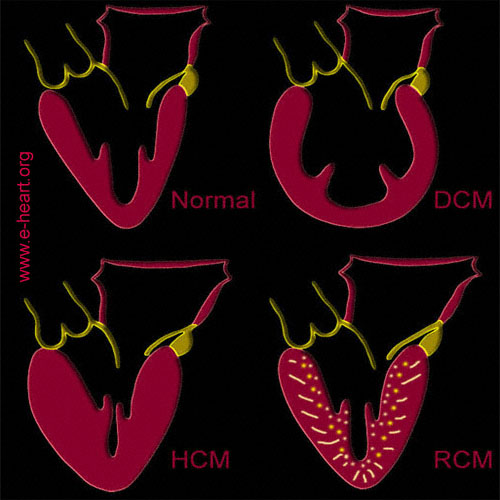What is a Cardiomyopathy?
“Cardiomyopathy” is a term that refers to the inability of the heart muscle to contract appropriately to meet the demands of the body . Historically when the term was coined by Goodwin, it was meant to be a diagnosis of exclusion after ruling out common entities such as valvular disease or ischemic heart disease as the cause of the heart failure.
There are several types of cardiomyopathies defined by the World Health Organization on the basis of their pathologic or pathophysiologic features: “Dilated or cardiomyopathy” or DCM, “Hypertrophic cardiomyopathy” or HCM, “Restrictive cardiomyopathy” or RCM, “Ischemic cardiomyopathy” or ICM, and cardiomyopathies due to or associated to specific systemic diseases. One particular type of cardiomyopathy which primarily affects the right ventricle is called Arrhythmogenic Right Ventricular Dysplasia / Cardiomyopathy or ARVD / C. Some of these morphologic types of cardiomyopathies are clearly secondary to specific diseases such as myocarditis, sarcoidosis, amyloidosis or hemochromatosis. In addition genetic causes of cardiomyopathy or storage diseases can also present clinically as cardiomyopathies. Recently the American Heart Association published an article describing a new framework for the classification of cardiomyopathies.
 The morphologic features of the cardiomyopathies are shows in this illustration. For comparison the normal architecture of the left ventricle is shown in the top right illustration. In DCM the left ventricle shows increase in size and volume. In HCM the ventricular walls are thick and the ventricular chamber is consequently reduced in volume. In RCM the ventricular wall may or may not be thicker. The restriction to the wall movement may be due to disease(s) that affect the endocardium of the heart or that actually infiltrate the myocardium.
The morphologic features of the cardiomyopathies are shows in this illustration. For comparison the normal architecture of the left ventricle is shown in the top right illustration. In DCM the left ventricle shows increase in size and volume. In HCM the ventricular walls are thick and the ventricular chamber is consequently reduced in volume. In RCM the ventricular wall may or may not be thicker. The restriction to the wall movement may be due to disease(s) that affect the endocardium of the heart or that actually infiltrate the myocardium.

